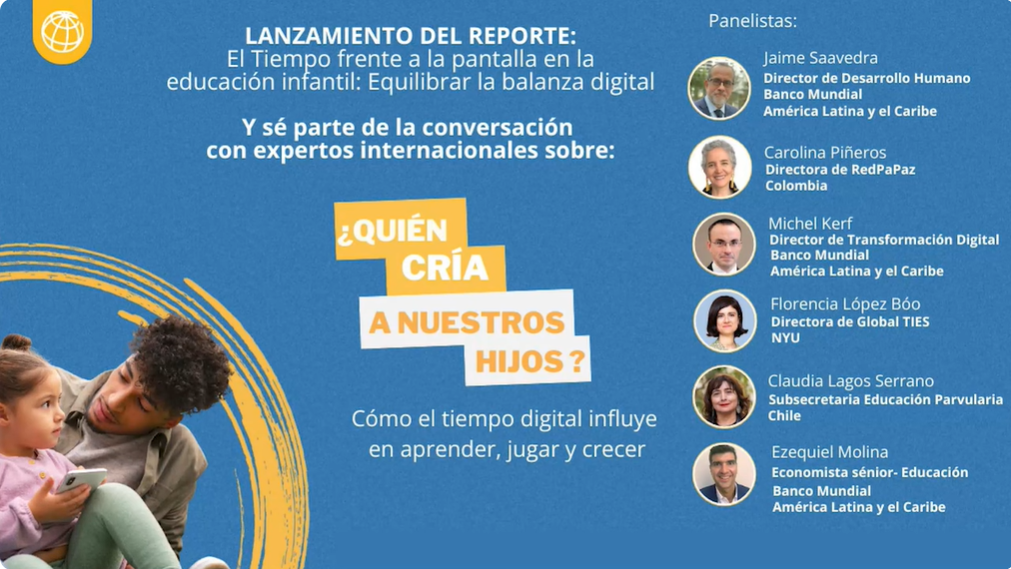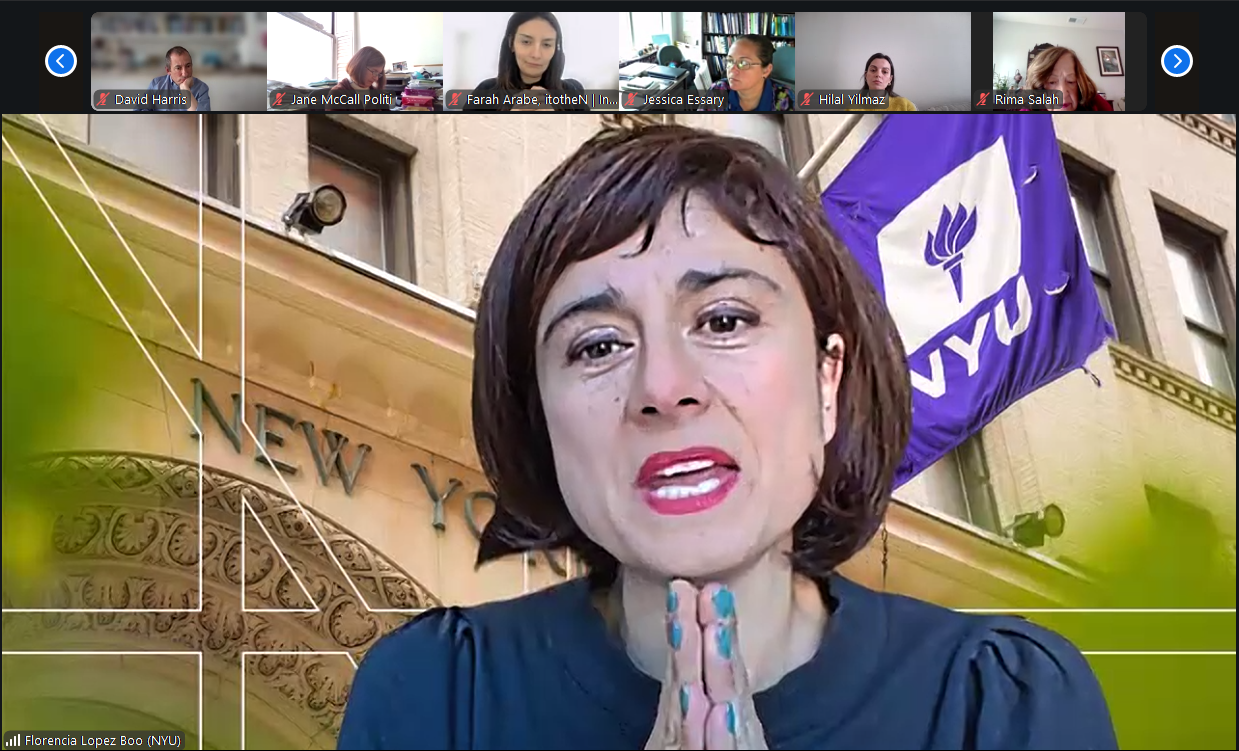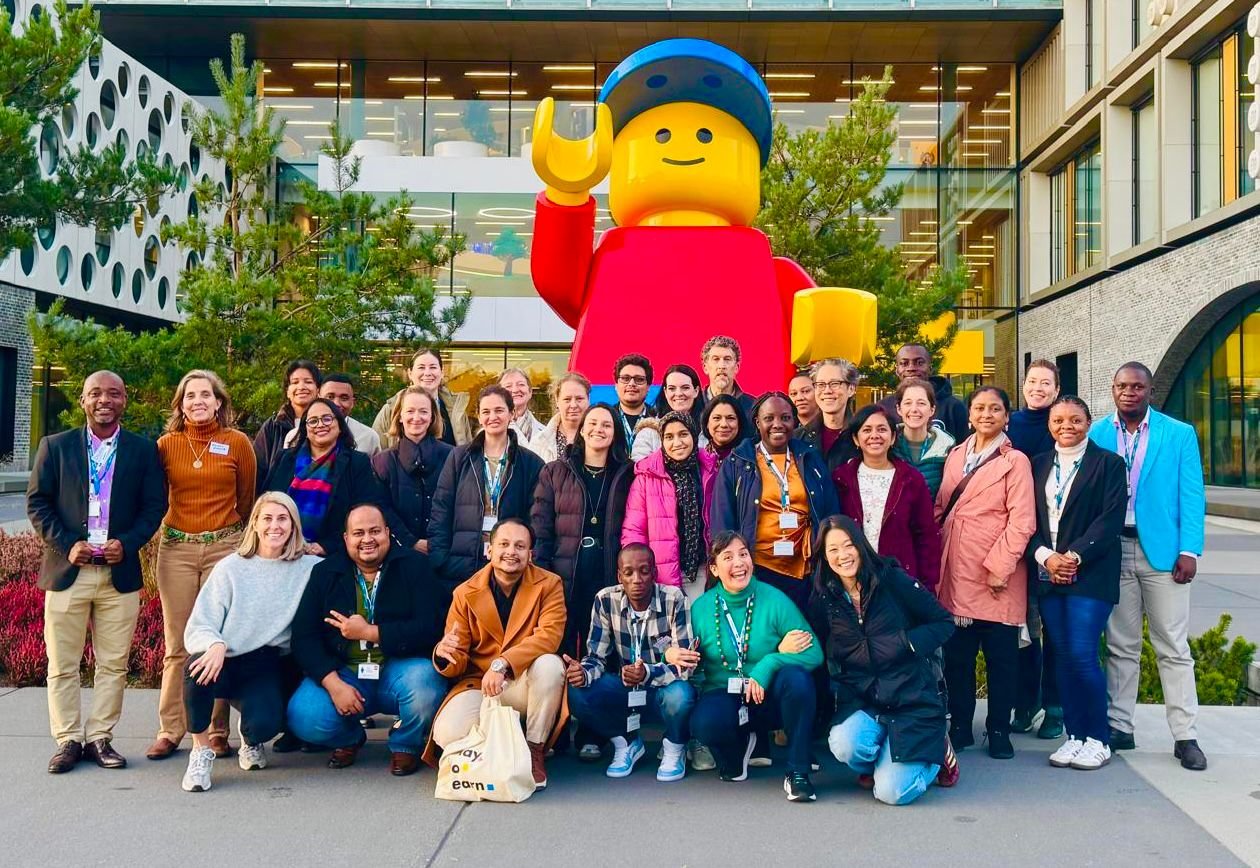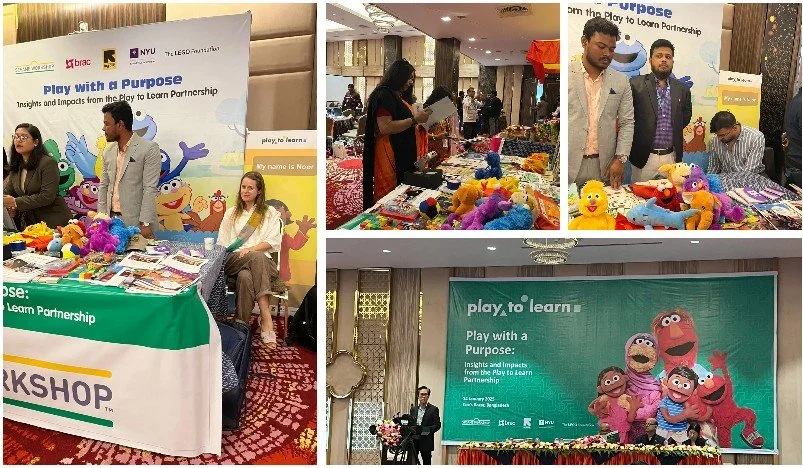Resources
Webinar en Español: “Quién cría a nuestros hijos, cómo el tiempo digital influye en aprender, jugar y crecer”
On January 9, 2026, our Director, Florencia Lopez Boo, joined a World Bank panel discussion “Quién cría a nuestros hijos, cómo el tiempo digital influye en aprender, jugar y crecer” as part of their broader initiative on early childhood education and digital environments, aiming to ground public debate and policy decisions in research rather than fear, hype, or one-size-fits-all prescriptions. Florencia Lopez Boo contributed an evidence-based perspective on young children’s learning and development in increasingly digital contexts.
The event convened researchers and policy leaders to examine how digital exposure is reshaping early childhood at home, in education systems, and across broader care environments in Latin America and the Caribbean.
The recording of the webinar “Quién cría a nuestros hijos, cómo el tiempo digital influye en aprender, jugar y crecer,” organized by The World Bank, is now available online.
Florencia Lopez Boo presented at an official side event of the 64th Session of the UN Commission for Social Development
On February 5, 2026 Florencia Lopez Boo, Director of Global TIES for Children, spoke on a virtual panel convened as an official side event of the 64th Session of the UN Commission for Social Development.
The discussion focused on how integrated social protection and early childhood care and education can better safeguard children’s rights and support more just and resilient societies, particularly in contexts of crisis and displacement. Florencia shared experiences from a collaboration between Global TIES for Children, GHESKIO, and IDB to pilot an adaptation of a remote early learning program for children in Haiti, whose school is often disrupted because of political violence and unrest.
Florencia Lopez Boo presented at the Inaugural Nutrition & Early Years Advisory Group (NEYAG)
Congratulations to all those involved in launching the Nutrition & Early Years Advisory Group (NEYAG), which was inaugurated on December 4, 2025 at a meeting titled: “Shaping the Future of Africa: Nutrition and Early Childhood Development as Game Changers.”
Hosted in Dakar by the World Bank and partners, the meeting brought together leaders across sectors to advance strategies that strengthen human capital through improved nutrition and early childhood development.
At the event today, our Director, Florencia Lopez Boo, shared insights from Global TIES for Children’s research portfolio on how to integrate health, nutrition, and child development policies, highlighting evidence on what policy environment is needed to enable such integration and what governance structures and regulations can inform impactful, scalable policies across the continent.
Hirokazu Yoshikawa Awarded the 2025 Klaus J. Jacobs Research Prize
The award recognizes his pioneering research on the ways public policies and programs, particularly in early childhood and immigration, shape human development.
Engage team members participate in the project’s final Comunity of Practice convening
From November 3-6, 2025, Hirokazu Yoshikawa and Sharon Kim represented Global TIES for Children at the final Engage Community of Practice convening, organized by EDC and hosted at the LEGO Foundation headquarters in Billund, Denmark.
Over three days, partners from across the Engage portfolio shared evidence and lessons on strengthening student engagement in early childhood and primary education across diverse contexts.
The sessions focused on:
Insights from implementing and adapting the Engage tools
Trends emerging across countries and developmental levels
How data can drive program improvement and system-level change
This convening wasn’t a “show-and-tell.” It was hands-on, reflective, and honest about what it takes to embed child-centered, playful learning approaches into teaching and learning systems—and sustain them.
Florencia Lopez Boo, Orazio Attanasio, Diana Perez-Lopez, Sarah Anne Reynolds, published an article discussing inequality in early childhood development in Latin America
Gaps in child development by socio-economic status (SES) start early in life, are large and can increase inequalities later in life. We use recent national-level, cross-sectional and longitudinal data to examine inequalities in child development (namely, language, cognition and socio-emotional skills) of children 0–5 in five Latin American countries (Chile, Colombia, Mexico, Peru and Uruguay). In the cross-section analysis, we find statistically significant gaps with inequality patterns that widely differ across countries. For instance, gaps in language and cognition for Uruguay and Chile are much smaller than those for Colombia and Peru. When turning to the longitudinal data, average SES gaps are similar to those of the cross-section in language but differ substantially in cognition, mainly in Uruguay where they emerge as more unequal when cohort effects do not operate. Importantly, we also find that the ECD gaps found at early ages (0–5) still manifest 6–12 years later in almost all locations and realms in which we have measures of early child development, but they do not increase with age. Results are robust to using different measures of inequality (income and maternal education). Gaps are smaller but generally remain when adjusting for possible explanatory factors (e.g. family structure, parental education, geographic fixed effects). To reduce ECD inequality and promote equality in later life outcomes, policymakers should look to implementing evidence-based interventions at scale to improve developmental outcomes of the most disadvantaged children in society.
Watch Florencia Lopez Boo’s 2025 Thrive Conference Keynote
Florencia Lopez Boo had the honor of delivering a keynote on “Investing Better in Child Development Policies, ”sharing reflections on how we can improve the design and delivery of impactful programs at scale.
Florencia Lopez Boo delivers 2025 Thrive Conference Keynote
Florencia Lopez Boo had the honor of delivering a keynote on “Investing Better in Child Development Policies,”sharing reflections on how we can improve the design and delivery of impactful programs at scale.
We were also proud to present our poster on hybrid modalities of parenting programs from Jamaica, highlighting how flexible, evidence-informed models can better support families. Special thanks to Susan Walker and Fahmida Tofail for the insightful discussions.
Early Childhood Parenting Support – Call Quality Instrument (ECPS-CQI)
The ECPS-CQI instrument was developed in English by Anaga Ramachandranm, Dalia Al Ogaily, Kate Schwartz, Joyce Rafla and Hirokazu Yoshikawa and used to measure the quality of interactions during a phone call with a parent or caregiver. The instrument assesses the domains of relationship with family, responsiveness to family strength, needs, and culture, facilitation of caregiver-child interaction, and active listening. The ECPS-CQI tool has shown promising evidence for reliability and validity, and with caution, it can be used for intended purposes with similar samples/contexts.
Global TIES Hosts ‘Early Childhood Matters’ Launch Event - NYU Steinhardt News
Attendees from NYU, multilateral development banks, and early childhood NGOs and foundations discussed parental support initiatives.
Housed at NYU Steinhardt, Global TIES for Children hosted a launch event for the latest edition of the Van Leer Foundation’s flagship Early Childhood Matters journal last month at the Kimmel Center.
Around 60 people attended the launch event, including representatives from around NYU, such as faculty and staff from Steinhardt and NYU Langone. Also in attendance were practitioners from the early childhood community in New York City, including the International Rescue Committee, Sesame Workshop, Save the Children, and Innovations for Poverty Action.
Launch of Early Childhood Matters 2025 Edition
What does it mean to truly support parents and caregivers in shaping the future of children’s development?
From policy and research to insightful conversations and a moving performance by Carnegie Hall’s Lullaby Project, our recent gathering at NYU brought together powerful voices to explore just that—through the lens of the latest issue of #EarlyChildhoodMatters2025, published by Van Leer Foundation.
When we support those who care for children, we invest in a stronger, more compassionate future.
Read Early Childhood Matters 2025: https://lnkd.in/gAiS87JQ
Navigating Remote Early Childhood Education in Hard-to-Access Settings: A Qualitative Study of Caregivers’ and Teachers’ Experiences in Lebanon
Despite the immense challenges of economic crises, power outages, and unreliable internet, caregivers in Lebanon’s hard-to-access areas went to extraordinary lengths to ensure their children could participate in remote early childhood education. Their profound commitment to learning and resilience in the face of adversity underscores the critical role of early education, even in crisis settings.
Building on our team at NYU’s Global TIES for Children’s impact findings from a three-arm randomized controlled trial—showing significant impact on child development from a short remote ECE intervention—this newly published qualitative article offers a deeper, behind-the-scenes perspective. Applying Weisner’s ecocultural framework, we explore how caregivers integrated remote early learning into their daily lives, navigating cultural and environmental constraints. While theory suggests that intervention success depends on aligning with participants’ routines, our findings reveal that these programs thrived despite the absence of structured daily rhythms, demonstrating remarkable adaptability.
Our mixed-methods research challenges the common narrative by showing that remote ECE programs can, in fact, provide quality learning opportunities for children facing adversity. The study highlights the resilience of caregivers and teachers, offering valuable insights for designing flexible, impactful educational interventions in crisis-affected and resource-limited settings.
Effects of Integrating Early Childhood with Health Services: Experimental Evidence from the Cresça com Seu Filho Home-Visiting Program
Delivering early-childhood programs at scale is a major policy challenge. One way to do so is by using existing public infrastructure. This paper experimentally assesses the short-term effects of a new government home-visiting program integrated into health-care services in Brazil. The program changed the allocation of time for community health workers by asking them to carry out tasks related to early-childhood development. We find that access to the program has a positive but modest effect on home environment quality and no effect on child development or on children’s health status. Our results point to the importance of workload, supervision, and buy-in from delivery actors to enhance fidelity of interventions.
Celebrating a Milestone: Play to Learn Team Shares Insights at Cox’s Bazar ‘Play with a Purpose’ Event
This event, organized in January 2025, showcased the six-year project’s accomplishments and learnings, including groundbreaking research led by NYU-TIES on media-supported early childhood development (ECD) program models and innovative approaches to integrate fathers in the nurturing care of young children as well as findings from the first-ever large, prenatal birth cohort study with a displaced population. The interactive sessions, featuring voices and stories from our work, highlighted the barriers we've overcome and the strides we're making towards placing children at the center of humanitarian responses.
The cost of not investing in the next 1000 days: implications for policy and practice
Building on the evidence from the first paper in this Series highlighting the fundamental importance of healthy and nurturing environments for children's growth and development in the next 1000 days (ages 2–5 years), this paper summarises the benefits and costs of key strategies to support children's development in this age range. The next 1000 days build on the family-based and health-sector based interventions provided in the first 1000 days and require broader multisectoral programming. Interventions that have been shown to be particularly effective in this age range are the provision of early childhood care and education (ECCE), parenting interventions, and cash transfers. We show that a minimum package of 1 year of ECCE for all children would cost on average less than 0·15% of low-income and middle-income countries' current gross domestic product. The societal cost of not implementing this package at a national and global level (ie, the cost of inaction) is large, with an estimated forgone benefit of 8–19 times the cost of investing in ECCE. We discuss implications of the overall evidence presented in this Series for policy and practice, highlighting the potential of ECCE programming in the next 1000 days as an intervention itself, as well as a platform to deliver developmental screening, growth monitoring, and additional locally required interventions. Providing nurturing care during this period is crucial for maintaining and further boosting children's progress in the first 1000 days, and to allow children to reach optimal developmental trajectories from a socioecological life-course perspective.
🔗 Read more here: https://doi.org/10.1016/S0140-6736(24)01390-4
Developing and Implementing a Measure of Quality of Home Visit Interactions for Fathers: the Rohingya Camps and Host Communities in Cox’s Bazar, Bangladesh
As part of the Play to Learn initiative, with funding from the LEGO foundation, BRAC and Sesame Workshop designed a 6-month fathers’ engagement component to be added to an existing parenting intervention for mothers. The program was developed for fathers of children aged 0-3 in the Rohingya camps and surrounding host communities in Cox’s Bazar, Bangladesh, and focuses on mental health, responsive caregiving, and engagement with family. As part of an impact evaluation of the intervention1, we at Global TIES, New York University, developed an instrument to measure the quality of the intervention delivery.
This brief discusses the importance of measuring quality, the process of developing and implementing this quality instrument, and the preliminary analysis of data collected using it. In addition to informing the impact evaluation, a broader goal of this work is to contribute to the emerging knowledge on measuring program quality and fidelity, particularly in low and middle income countries (LMIC) and emergency contexts, and better understand “how” and “why” parenting programs in these contexts do or do not work.
Community Engagement for Early Childhood Development (ECD) Programs: Perspectives of the Rohingya and Other Stakeholders in Cox’s Bazar
Since its inception, partners of the LEGO Foundation-funded Play to Learn project have prioritized co-construction and community engagement1, 2 in designing and running programs that target children and caregivers in Bangladesh affected by the Rohingya displacement crisis. This includes the Humanitarian Play Labs (HPLs), a flagship program of BRAC, one of the main humanitarian partners implementing early childhood development (ECD) activities under Play to Learn. Given the emphasis and importance placed on community engagement in the HPL set-up and operations, Global TIES for Children at NYU, as the main research partner of the project, conducted a specific study to better understand the myriad ways in which community engagement happened around the HPLs and was perceived by the community. The study team, which included project partners and our data collection partner, Arced Foundation, was particularly interested in how participating community members experienced and understood these programs and how they would like to be engaged to sustain them beyond the lifetime of the six-year Play to Learn project.
In conducting this research, the study team deliberately employed participatory research approaches that themselves relied on community engagement as a key strategy for generating specific research questions (related to the study’s focus areas), collecting data, and interpreting community input. This brief discusses the importance of participatory research, the process of running a participatory workshop, and reflections on how the data generated is of particular value to humanitarian implementers. In addition to informing program delivery, a broader goal of this work is to contribute to understanding both the “how” of participatory research methods (what goes into them, how they can be organized) and the “why” behind them (the benefits of multi-method approaches and community engagement as key research strategies).
Developmental Losses in Young Children from Preprimary Program Closures during the COVID-19 Pandemic
This article is among the first to quantify the actual impact of pandemic-related closures on early child development, in this case, for a sample of young children in Chile, where school and childcare closures lasted for about a year. We use a unique data set collected face-to-face in December 2020, which includes child development indicators for general development, language development, socioemotional development, and executive function. We find adverse impacts on children in 2020 compared to children interviewed in 2017 in most development areas. In particular, 9 months after the start of the pandemic, we found a loss in language development of 0.25 SD.
🔗 Read more here: https://doi.org/10.1086/731588




















